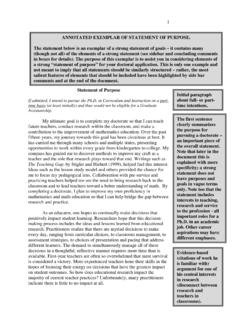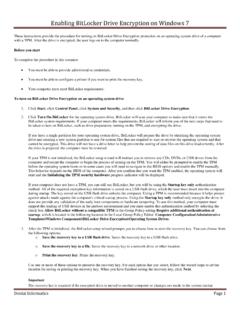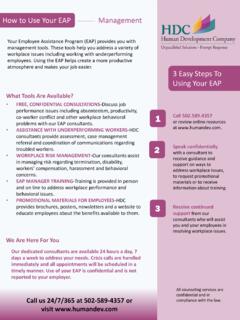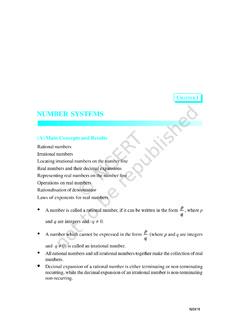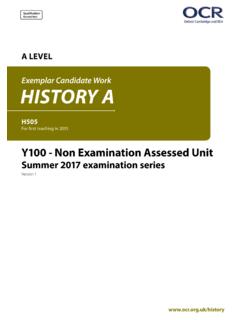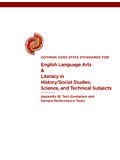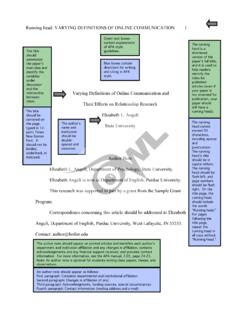Transcription of ANNOTATED EXEMPLAR OF STATEMENT OF PURPOSE. …
1 1 STATEMENT of Purpose If admitted, I intend to pursue the in Curriculum and Instruction on a part-time basis (at least initially) and thus would not be eligible for a Graduate Assistantship. My ultimate goal is to complete my doctorate so that I can teach future teachers, conduct research within the classroom, and make a contribution to the improvement of mathematics education. Over the past fifteen years, my journey towards this goal has been circuitous at best. It has carried me through many schools and multiple states, presenting opportunities to work within every grade from kindergarten to college. My compass has guided me to discover methods to improve my craft as a teacher and the role that research plays toward that end.
2 Writings such as The Teaching Gap, by Stigler and Hiebert (1999), helped fuel this interest. Ideas such as the lesson study model and others provided the chance for me to focus my pedagogical lens. Collaboration with pre-service and practicing teachers helped me see the need to bring research back to the classroom and to lead teachers toward a better understanding of math. By completing a doctorate, I plan to improve my own proficiency in mathematics and math education so that I can help bridge the gap between research and practice. As an educator, one hopes to continually make decisions that positively impact student learning. Researchers hope that this decision-making process includes the ideas and lessons learned from educational research.
3 Practitioners realize that there are myriad decisions to make every day, ranging from curricular choices, to classroom management, to assessment strategies, to choices of presentation and pacing that address different learners. The demand to simultaneously manage all of these decisions in a thoughtful, reflective manner requires more time than is available. First-year teachers are often so overwhelmed that mere survival is considered a victory. More experienced teachers hone their skills in the hopes of focusing their energy on decisions that have the greatest impact on student outcomes. So how does educational research impact the majority of current teacher practices?
4 Unfortunately, many practitioners indicate there is little to no impact at all. The first sentence clearly summarizes the purpose for pursuing a doctorate an important piece of the overall STATEMENT . Note that later in the document this is explained with more specificity; a strong STATEMENT does not leave purposes and goals in vague terms only. Note too that the STATEMENT includes interests in teaching, research and service to the profession - all important roles for a in an academic job. Other career aspirations may have different emphases. ANNOTATED EXEMPLAR OF STATEMENT OF PURPOSE. The STATEMENT below is an EXEMPLAR of a strong STATEMENT of goals it contains many (though not all) of the elements of a strong STATEMENT (see sidebar and concluding comments in boxes for details).
5 The purpose of this EXEMPLAR is to assist you in considering elements of a strong STATEMENT of purpose for your doctoral application. This is only one example and not meant to imply that all statements should be similarly structured rather, the most salient features of elements that should be included have been highlighted by side bar comments and at the end of the document. Evidence-based (citations of work he is familiar with) argument for one of his central interests in research (disconnect between research and teachers in classrooms). Initial paragraph about full- or part-time intentions. 2 For many teachers, research does not seem to factor into their decision-making process.
6 Dr. Judith Sowder (2000) writes, Many teachers and policy makers believe that most research has little relevance to the decisions they must make (p. 106). Research is often seen as impractical or written in a form that is not accessible to many teachers. Sowder cites an article by Kennedy (1997) in Educational Researcher, stating that teachers often feel research does not answer the questions they have; nor does it adequately consider their constraints. All of these hurdles limit the connection between research and practice. During my tenure as a math department chair and as a district math resource teacher, I found this aversion to research a prevailing mindset.
7 Less experienced teachers were often so overwhelmed with the daily pace that they simply wanted tips on classroom management and survival techniques. More experienced teachers usually resisted using research for one of three main reasons. First, they had endured too many poorly run professional development activities in which research seemed impractical. Second, they felt their curricular tool bag was full, and they no longer needed to grow pedagogically for their students to achieve. Lastly, even if they felt they might benefit, they often felt overwhelmed by the amount of material to wade through and underwhelmed by the resources they had to assist them in the cause.
8 If math educators value research and hope to make a positive impact on student learning from the results they achieve, then they must find a way to help practicing and future teachers see research as relevant to the choices they make. My experience in graduate school reinforced my desire to help bridge this gap between teachers and research. Through my work with pre-service teachers, I was able to create the norm of using research to guide instruction. I saw the benefit of exposing future teachers not only to research findings, but also to ideas that might help shape their own conceptual understanding of mathematics. My interactions during this time, both with pre-service teachers and their mentors, reinforced my belief that greater understanding of mathematical proficiency is required from teachers before adequate gains in students mathematical skills can be achieved.
9 We hope that our students will gain a proficient understanding of mathematics. Yet to afford this opportunity, we expect our teachers to comprehend what mathematical proficiency means. In Adding It Up (2001), Kilpatrick, Swafford, and Findell describe this proficiency as containing five different components: conceptual understanding, procedural fluency, strategic competence, adaptive reasoning, and productive disposition. Exploring these ideas with teachers, I realized that many considered proficiency simply to mean procedural competency. Connects research interests and career trajectory to past history. It is helpful to make this connection for readers, but your STATEMENT should not be exclusively about past teaching experiences, but rather contextualize relevant experiences in terms of their relationship to a program and doctoral studies.
10 The overall message of the STATEMENT should be forward-looking rather than backward. Specific examples demonstrate knowledge in the specialty field (mathematics) but again is contextualized in terms of its relationship to a program. This demonstrates an ability to understand how to frame problems in a particular field of study within a program of study. 3 Others would create a dichotomy between conceptual understanding versus calculational fluency. My interactions with teachers taught me the necessity of reflecting on these and other mathematical ideas through collaboration and discourse. The reality is that this is not a simple task, and it demands that teachers explore their own understanding of mathematics.
